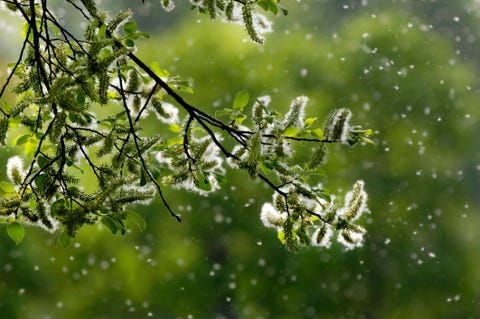The Best Natural Remedies for Allergies and Sinus Problems
Allergy season is officially upon us, and that means here comes itchy, watery eyes, a runny nose, scratchy throat, and the sniffles. We can all agree that allergy symptoms are the worst. The question is, what can you do about them?
There are plenty of over-the-counter medications that are quite effective in taming seasonal allergies. And allergy shots or the newer sublingual tablets for certain allergies can help you respond less dramatically to the allergens that bother you.
But if you want a little extra relief, there are a few at-home natural remedies for allergies and sinus problems you can try. But first, it helps to know what’s going on that’s causing the allergic reaction to begin with.
What’s causing your allergies
“An allergy is when your immune system reacts to something that’s normally harmless to most people. If you come into contact with a substance that your immune system views as a threat, called an allergen, it responds by releasing a chemical called histamine and other substances,” says Lakiea Wright, M.D., a Board Certified Physician in Internal Medicine and Allergy and Immunology.
And that’s what feels like trouble to you. Whether your immune system thinks it’s threatened by anything from pollen and mold to animals and food, you might find yourself sneezing, blowing your nose, and rubbing your bloodshot and teary eyes all day long.
If you want some relief in addition to allergy medications—and in a 2017 survey of allergists, 81 percent said they had patients who did want alternative or natural allergy remedies—there are a few non-drug remedies that may help.

BrianAJacksonGetty Images
Home Remedies for Pollen Allergies
The first step is to talk with your healthcare provider about getting tested to determine if, in fact, your allergy is caused by pollen and that it’s not something like a chemical sensitivity, Wright says. “Every spring, millions of people seek out allergy relief through over-the-counter drugs without really knowing their diagnosis,” she says. “But we’ve seen firsthand how life-changing it can be when you finally know what’s causing those problems with breathing, itching, rashes, or congestion.”
Keep the pollen away
If pollen’s your problem, then make an effort to avoid it. It’s pretty straightforward: Shower after you’ve spent time outdoors, and if you’ve been out for a long time, shed your outer layers while you’re outdoors, put them in a bag and take them right to the washing machine. Then shower to rid your body of allergens, and wash your hair, too.
If pollen counts are high, stay indoors if you can. Keep windows closed at home and in the car, and use high-efficiency particulate air (HEPA) filters for furnace and vacuum cleaners, as a few examples.

AlkimsonGetty Images
If you’re allergic to pollen, that allergen might not be the only reason why you’re sneezing like crazy. “It may be because you are sensitive to more than one allergen,” she says. “Again, I would advise talking with your healthcare provider about getting tested and then employing strategies for trigger avoidance,” Dr. Wright says.
Try steam inhalation
“Steam inhalation can help open sinuses and airways and reduce inflammation,” says Purvi Parikh, M.D., allergist and immunologist with the Allergy & Asthma Network. By boiling water and inhaling steam or running a hot shower and inhaling steam, it helps open nasal passages that are congested and relieves sinus pressure. Do this for a few minutes for some relief. Of course, the relief goes away pretty quickly, but you can do this frequently and it generally feels great.

Toa55Getty Images
Use a salt-water nasal rinse (yes, a neti pot)
When it comes to natural or alternative remedies for allergies, “most of us allergists are pretty on board with saline nasal irrigation,” says Courtney Jackson Blair, M.D., vice president of the Greater Washington Allergy, Asthma and Immunology Society and owner of Allergy and Asthma Associates in Virginia. “There are plenty of studies that show that gentle nasal irrigation improves quality of life for people with allergies,” she says. “It can make the difference between being comfortable and uncomfortable, and it may even let you cut down on medications.”
There are lots of ways to do nasal irrigation. You can use a neti pot, or you can use one of the squeeze bottles on the market (“just don’t squeeze too hard; you don’t want to power wash the inside of your nose,” says Dr. Blair.). Either way, make sure you use distilled water and premixed saline packets and that your pot or bottle is clean—there have been rare reports of amoebas in non-distilled water causing serious problems for people who used nasal irrigation.
Pop a probiotic
Probiotics aren’t a proven allergy reliever, but there’s some evidence they might be useful, Dr. Wright says. Probiotics increase good bacteria in your gut, which is thought to help regulate allergy cells throughout the body. “Having an abundance of good bacteria may help prevent your allergy cells from being overly active,” she explains. Have one or two probiotic capsules, like Culturelle or Align, a day and feel free to enjoy probiotic-rich foods, like Greek yogurt and miso.
Try acupuncture
“It’s hard to know whether you’re getting much of a benefit from it,” says Dr. Blair. There are some studies that suggest it might help, but it’s not usually all that cheap. “It’s one of those situations where you wonder, ‘how many sessions are you going to need to have before you’re saving yourself one Zyrtec?'” she adds. There can also be a strong placebo effect—which is still an effect, but in this case, probably a somewhat pricey one. It’s probably not going to be harmful, she suggests, but it may not be all that helpful for allergies right now.
Use a cold compress
A cold compress may help relieve environmental allergy symptoms for a runny or stuffy nose or watery, itchy eyes, which come from the release of histamine from allergy cells, Wright says. “Exposure to a cold compress will likely reduce your allergy cell activity and thus will likely reduce your symptoms by reducing histamine and inflammation,” she explains. Simply apply a cold washcloth to your face and keep on it for a few minutes at a time.

LightFieldStudiosGetty Images
Try a nasal ointment
“Cellulose-based and allergen-absorbing ointments have demonstrated efficacy in treating nasal symptoms,” Dr. Wright says. These nasal ointments act as a physical barrier to minimize effects of inhaled allergens on nasal membranes, and they’re easy to carry around with you when you need some relief.
But don’t think apple cider vinegar will do the trick
Sorry to burst your bubble, but there is no evidence from clinical studies to suggest that apple cider vinegar works to treat allergies, Dr. Wright says. Some people believe that mixing one or two tablespoons of ACV in water or some lemon juice and chugging anywhere up to three times a day may help reduce symptoms and break up mucus, but there’s no evidence to really support this as a natural remedy for allergies.
So, take a pass on this one and look to the other above remedies for better effects!

Source: Read Full Article
